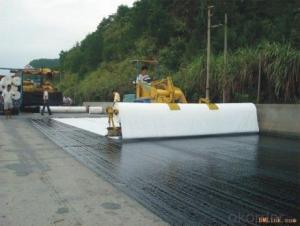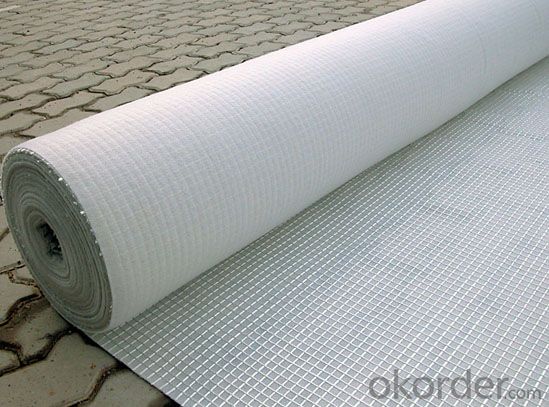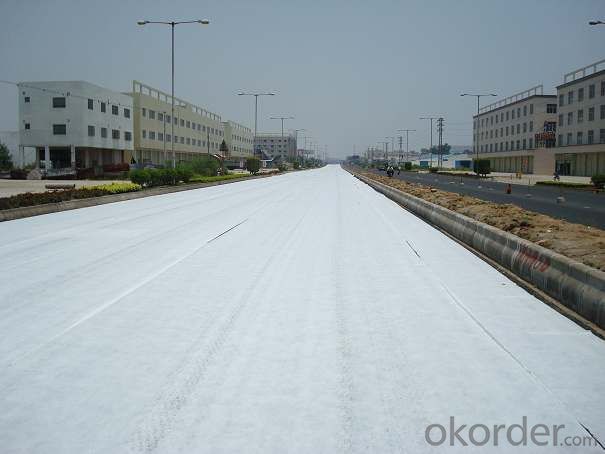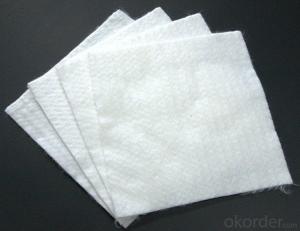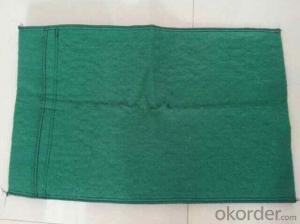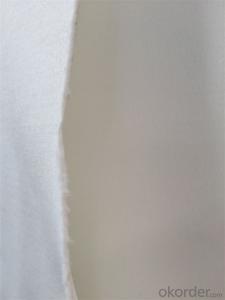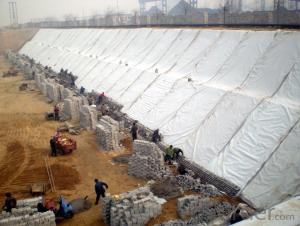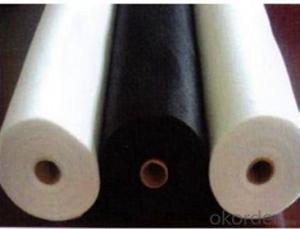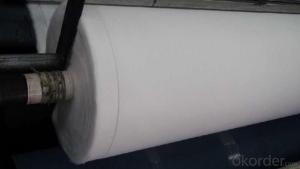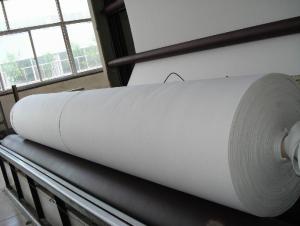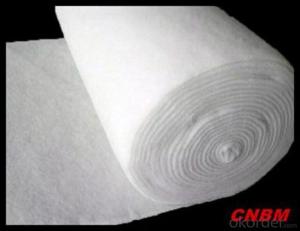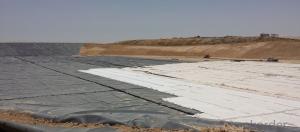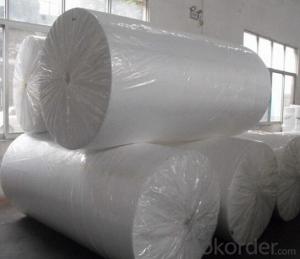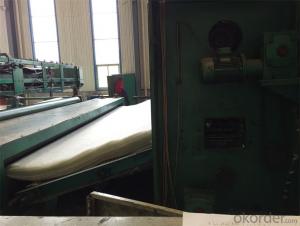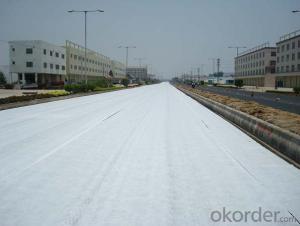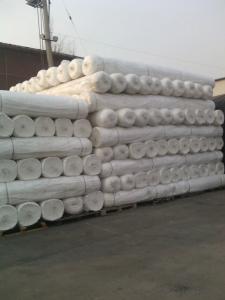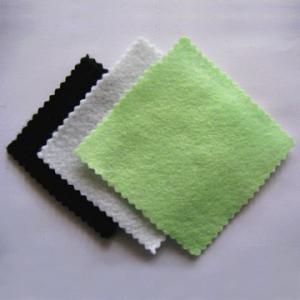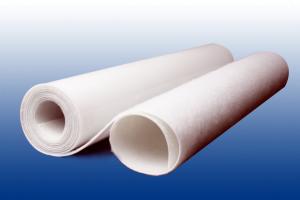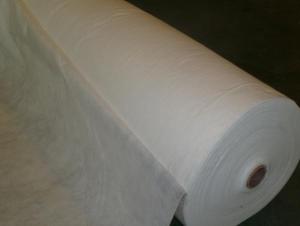Geotextile Felts Nonwoven Geotextile Short Fiber Fabric Separation Needle
- Loading Port:
- Qingdao
- Payment Terms:
- TT or L/C
- Min Order Qty:
- 10000 m²
- Supply Capability:
- 100000 m²/month
OKorder Service Pledge
OKorder Financial Service
You Might Also Like
Introduction
Non woven Geotextile is Synthetic Staple Needle punched Nonwoven Geotextile made of PET or PP. comes in 6m wide rolls with 100-800g/m2. Offering specialized properties including high break strength which can reach 20kN/m, good creep properties and excellent chemical resistance, the products can be applied in construction projects such as water conservancy projects, daykes, dams, road and railway project, airport, environmental protection projects, in which play the role of filter, drainage, separator, and reinforcement.
PET Short Fiber Needle-Punched Non woven Geotextile Physical characteristics
Specification
CategoryProperty | 100 | 150 | 200 | 250 | 300 | 350 | 400 | 450 | 500 | 600 | 800 |
Deviation of Mass Per Unit (%) | -8 | -8 | -8 | -8 | -7 | -7 | -7 | -7 | -6 | -6 | -6 |
Thickness (≥mm) | 0.9 | 1.3 | 1.7 | 2.1 | 2.4 | 2.7 | 3.0 | 3.3 | 3.6 | 4.1 | 5.0 |
Tensile Strength At Break (≥kN/m) | 2.5 | 4.5 | 6.5 | 8.0 | 9.5 | 11.0 | 12.5 | 14 | 16 | 19 | 25 |
Elongation at Break (%) | 25~100 | ||||||||||
CBR Burst Strength(≥kN) | 0.3 | 0.6 | 0.9 | 1.2 | 1.5 | 1.8 | 2.1 | 2.4 | 2.7 | 3.2 | 4.0 |
EOS O90(O95)mm | 0.07~0.2 | ||||||||||
Coefficient of Vertical Permeability (cm/s) | K×(10-1~10-3) K=1.0~9.9 | ||||||||||
Tear Strength (≥kN) | 0.08 | 0.12 | 0.16 | 0.20 | 0.24 | 0.28 | 0.33 | 0.38 | 0.42 | 0.46 | 0.60 |
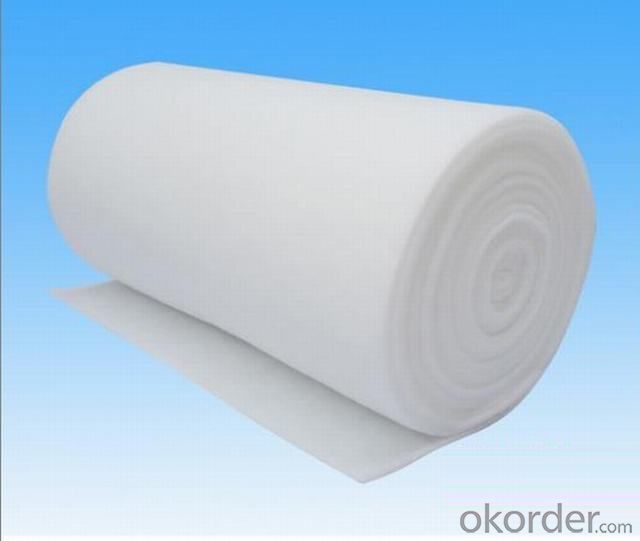

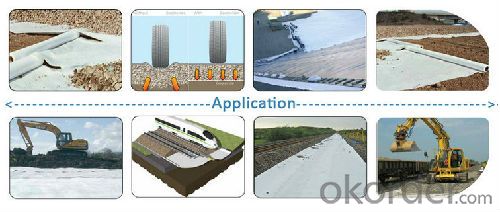
FAQ of our geotextile:
- Q: What can we do for the special customer?
A: Provide custom made service with customer's drawing; We make sure to provide you with the best solutions for your individual case. Whether standard items or non-standard items.
- Q: What can we supply?
A: We provide high levels of communication from start to finish.
- Q: What is our advantage?
A: Top Cemented Carbide has extensive business experience, Fast delivery and high quality.
- Q: What can the geotext crushed material be used?
- Can continue to be used to do geotextile, but because the geotextile after the strength of the fiber is affected, can only be crushed after the geotextile for the production of low grade geotextile, for example, the national standard geotextile crushed material can generally be used Non-standard geotextile production, but in strict accordance with the proportion of added, should not add too much crushed material.
- Q: How do geotextiles help with embankment stabilization?
- Geotextiles help with embankment stabilization by providing reinforcement and erosion control. They are placed within the embankment to distribute the load and increase its stability. Additionally, geotextiles prevent soil erosion by allowing water to drain through them while retaining the soil particles, thus preventing soil loss.
- Q: How do geotextiles help with filtration in stormwater management systems?
- Geotextiles help with filtration in stormwater management systems by acting as a barrier that prevents soil erosion and retains sediment and pollutants. They allow water to flow through while trapping particles, thus improving water quality and reducing the chances of clogging in drainage systems.
- Q: 200g geotextile how much money a square
- Geotextile laying - including the labor costs (according to geotextile specifications and laying conditions and requirements are different), material costs (specific quality requirements and thickness, are not the same ..), mechanical use costs (such as transport, sewing System, hoisting, etc.). The price is different. Sometimes the construction of our geotextile laying, the price per square meter from 9 yuan to 50 yuan range.
- Q: Geotextile how to construction?
- Geotextile construction is relatively simple with artificial roll: cloth to be flat, and appropriate to leave the deformation margin. The installation of filament or short wire geotextiles is usually carried out by means of lap, suture and welding. The width of the stitching and welding is generally 0.1 m or more, and the lap width is generally 0.2 m or more. May be exposed to long-term geotextile. It should be welded or stitched. All suture centers need to be carried out continuously (for example, spot joints are not allowed). Before the overlap, the geotextile must overlap at least 150mm. The minimum stitch is at least 25 mm from the weaving edge (the edge of the material exposed). Stitching the seam of the soil includes the first line and the line of the chain. The line used for suturing should be a resin material with a minimum tension of more than 60N. And with geotextile quite or beyond the anti-chemical corrosion and anti-ultraviolet ability. Any "missing needle" on the sewn geotextile must be re-sewn in the affected area. It is necessary to take appropriate measures to prevent the soil, particulate matter or foreign matter from entering the geotextile after installation.
- Q: The amount of geotextile drainage of the drainage pipe, as well as the amount of gravel block ye count
- Are you talking about plastic blinds? do you need? I specialize in producing geotextile materials
- Q: How do geotextiles help with erosion control in coastal dunes?
- Geotextiles help with erosion control in coastal dunes by acting as a barrier that prevents the loss of sand and sediment. They are placed on the surface of the dunes to stabilize the sand and provide reinforcement, reducing erosion caused by wind and water. Additionally, geotextiles promote the growth of vegetation by trapping sand and providing a stable base for plants to establish roots, further enhancing erosion control efforts.
- Q: What are the different geotextile installation techniques for steep slopes?
- There are several geotextile installation techniques that can be used for steep slopes. These include anchoring the geotextile with soil nails or rock bolts, using geotextile wraps or sleeves around soil or rock slopes, and installing geotextile mats or grids on the slope surface. These techniques help to stabilize the slope, prevent erosion, and improve overall slope stability.
- Q: Are geotextiles suitable for use in dam construction?
- Yes, geotextiles are suitable for use in dam construction. They can act as filters, separators, and reinforcements, providing erosion control, soil stabilization, and increased strength to the dam structure. Geotextiles can help prevent seepage, improve drainage, and enhance the overall performance and longevity of the dam.
- Q: Geotextile moisture-proof layer: 200 cloth +400 film +200 cloth
- You are not to composite geomembrane, I was specializing in the production of geotechnical materials, account number that phone
1. Manufacturer Overview
| Location | Taian City,Shandong Province,China |
| Year Established | 2008 |
| Annual Output Value | Above US$100 Million |
| Main Markets | Africa, Oceania, North America, Western Europe, Eastern Asia |
| Company Certifications | ISO9001;IS014001 Certificate |
2. Manufacturer Certificates
| a) Certification Name | |
| Range | |
| Reference | |
| Validity Period |
3. Manufacturer Capability
| a) Trade Capacity | |
| Nearest Port | Qingdao Port;Tianjing Port;Shanghai Port |
| Export Percentage | |
| No.of Employees in Trade Department | 21-30 People |
| Language Spoken: | English; Chinese; |
| b) Factory Information | |
| Factory Size: | 10,000-30,000 square meters |
| No. of Production Lines | Above 10 |
| Contract Manufacturing | Geotechnical Material (Geogrid,Fiberglass/Polyester Geogrid,Geocell,Geonet and Geomat,Plastic Safety Fence) |
| Product Price Range | Average |
Send your message to us
Geotextile Felts Nonwoven Geotextile Short Fiber Fabric Separation Needle
- Loading Port:
- Qingdao
- Payment Terms:
- TT or L/C
- Min Order Qty:
- 10000 m²
- Supply Capability:
- 100000 m²/month
OKorder Service Pledge
OKorder Financial Service
Similar products
Hot products
Hot Searches
Related keywords
